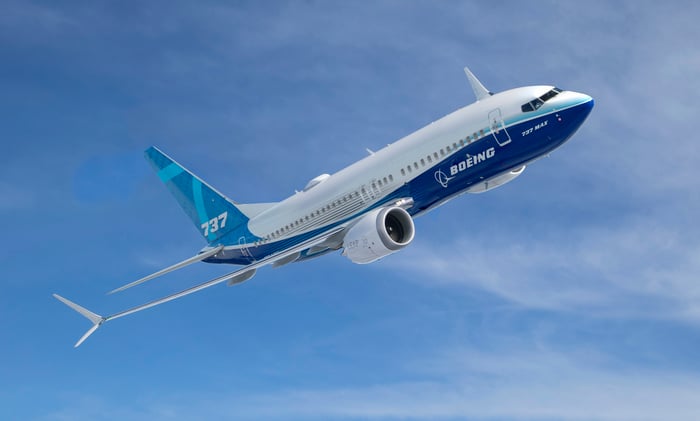Boeing's (BA 0.19%) announcement of a significant 737 MAX order from Pegasus Airlines is big news. It's a vote of confidence in the airplane and Boeing's ability to deliver it, and it helps highlight the bullish cash for the stock in 2025. Boeing has no easy or quick fixes, but most of its issues and solutions lie in its own hands, and the recent news supports the idea that a recovery is around the corner.
Boeing's orders in 2024
Pegasus made a firm order for 100 Boeing 737 MAX airplanes and can order a further 100. To put the importance of the order into context, consider that until the end of November, Boeing had only received 314 gross orders on the 737 year to date.
The following chart doesn't include the Pegasus order, so you can graphically extrapolate the importance of an order for 100 Boeing 737 MAX airplanes in the battle over narrowbody orders with Airbus.

Data source: Company presentations.
Why Boeing fell behind Airbus in the narrowbody market
The order is a shot in the arm for Boeing, not least because its recent issues have caused it to fall behind its rival, Airbus, in the key narrowbody market. The high-profile crashes in 2018 and 2019 were partly related to its flight stabilization system (MCAS) and caused the 737 MAX to be grounded from March 2019 to December 2020.
If that wasn't bad enough, the pandemic came along in 2020, and the 737 MAX suffered a high-profile blowout in early January 2024, leading management to address manufacturing quality fundamentally. Throw in a costly labor contract negotiation, which led to strike action – potentially causing airlines to delay orders– and it's clear that the 737 MAX has lost out to the Airbus A320neo in the current generation of narrowbody airplanes. I'll return to that point in a moment.

Image source: Boeing.
The order gives confidence
While one order, irrespective of its size, isn't going to be a game-changer in itself, it highlights the potential at Boeing. That starts with executing its unfilled orders, which stood at 6,268 (including 4,818 Boeing 737s) at the end of November. Aside from the quality control issues at Boeing, there was also the concern that airlines would fail to place orders due to a lack of confidence in Boeing's ability to deliver.
Those concerns are understandable when looking at just how Boeing's 737 production and delivery rates have slowed due to the need to reassess quality management and strike action. As a reminder, Boeing's original intention was to get to a stable rate of 38 a month on the 737 MAX in the year's second half. That's something that will have to wait until 2025. Still, the Pegasus deal helps allay those fears.

Data source: Company presentations.
Where will Boeing be in 2025?
Despite all the difficulties in recent years and the disappointing deliveries in 2024, Boeing's orders haven't dried up, and the company still has a backlog that management can deliver on.
As noted earlier, Boeing has fallen behind Airbus in the current generation of narrowbodies, but that's arguably already reflected in the share price. Nobody expects Boeing to suddenly trump Airbus in the narrowbody market, but it doesn't necessarily need to do so for the stock to outperform. Buying a stock is about buying value rather than, in this case, a vote on who has won the narrowbody airplane war.
The primary long-term target is to ramp up 737 MAX and 787 widebody production and deliveries while delivering the new 777X. At the same time, Boeing needs to return its defense business to profitability. These are the keys to unlocking shareholder value.

Image source: Getty Images.
All of these things will improve Boeing's financial position, enabling it to develop a new airplane for the next generation of airplanes. As CEO Kelly Ortberg outlined on an earnings call, "Boeing is an airplane company, and at the right time in the future, we need to develop a new airplane. But we have a lot of work to do before then.
Next year, Ortberg will aim to set Boeing on that path, but there won't be a pathway unless Boeing continues to win orders and carry the confidence of the airline industry, and that's what the Pegasus order helps to affirm.





